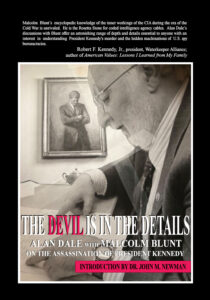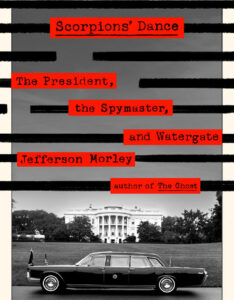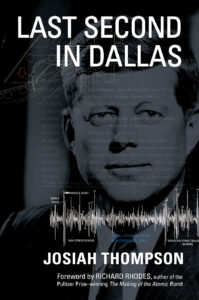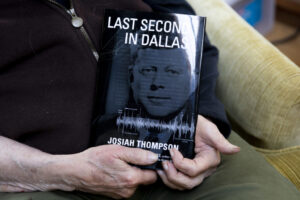Prescient, you say? Uh-huh.
 Following is from my Malcolm Blunt book, The Devil is in the Details, Chapter Seven, Quilted Patterns, published November 2020. The conversation took place in late November of 2016:
Following is from my Malcolm Blunt book, The Devil is in the Details, Chapter Seven, Quilted Patterns, published November 2020. The conversation took place in late November of 2016:Transcript by Mary Constantine.
 Following is from my Malcolm Blunt book, The Devil is in the Details, Chapter Seven, Quilted Patterns, published November 2020. The conversation took place in late November of 2016:
Following is from my Malcolm Blunt book, The Devil is in the Details, Chapter Seven, Quilted Patterns, published November 2020. The conversation took place in late November of 2016:Transcript by Mary Constantine.
 For the 50th anniversary of the Watergate break-in: The untold story of President Richard Nixon, CIA Director Richard Helms, and their volatile shared secrets that ended a presidency.
For the 50th anniversary of the Watergate break-in: The untold story of President Richard Nixon, CIA Director Richard Helms, and their volatile shared secrets that ended a presidency.
Scorpions’ Dance by intelligence expert and investigative journalist Jefferson Morley reveals the Watergate scandal in a completely new light: as the culmination of a concealed, deadly power struggle between President Richard Nixon and CIA Director Richard Helms.
Nixon and Helms went back decades; both were 1950s Cold Warriors, and both knew secrets about the disastrous Bay of Pigs invasion of Cuba as well as off-the-books American government and CIA plots to remove Fidel Castro and other leaders in Latin America. Both had enough information on each other to ruin their careers.
After the Watergate burglary on June 17, 1972, Nixon was desperate to shut down the FBI’s investigation. He sought Helms’ support and asked that the CIA intervene―knowing that most of the Watergate burglars were retired CIA agents, contractors, or long-term assets with deep knowledge of the Agency’s most sensitive secrets. The two now circled each other like scorpions, defending themselves with the threat of lethal attack. The loser would resign his office in disgrace; the winner, however, would face consequences for the secrets he had kept.
Rigorously researched and dramatically told, Scorpions’ Dance uses long-neglected evidence to reveal a new perspective on one of America’s most notorious presidential scandals.
“In this, his third biography of a senior CIA official, Jefferson Morley’s pen is sharp as a surgeon’s scalpel, his prose honed by years of sifting through information citizens were never meant to see. He gives us hidden history.”
—Anthony Summers, author of The Arrogance of Power and Pulitzer Prize finalist for The Eleventh Day
“Just when you think you’ve read everything there is to read about Watergate, along comes another analysis seen through a different lens. This is particularly true of Jefferson Morley’s new book Scorpions’ Dance: The President, the Spymaster, and Watergate. Mr. Morley’s lens is the relationship between President Nixon and Richard Helms, CIA Director through all but a few months of the Nixon presidency and it reveals a number of unexploded hand grenades previously undiscovered. The central issue is whether these two men enabled each other. No doubt, there is still more to be learned.”
–Gary Hart, United States Senator (Ret.)
“No historian today understands the Cold War White House better than Jefferson Morley. His decades of research into the Kennedy assassination, the intelligence agencies, and national security policy-making in the Vietnam era make him especially well equipped to untangle the complex of narratives, overlapping and conflicting, that comprise the Watergate scandal. Plumbing archival documents and other new evidence, Morley brings sensitivity and probity to his examination of the ill-fated Nixon-Helms relationship, and thereby makes Scorpions’ Dance a must read for students of those tumultuous times.”
–James Rosen, Newsmax chief White House correspondent and author of The Strong Man: John Mitchell and the Secrets of Watergate
“Jefferson Morley has written a fascinating account of the relationship between President Nixon and CIA Director Richard Helms. The book enriches our perspectives on Watergate while explaining how these two towering American Machiavelli’s aided each other’s corrupt ventures, to their own downfall and the disgrace of the high offices they held. It’s a warning to the governing elite in any era.”
–Larry J. Sabato, author of The Kennedy Half-Century and A More Perfect Constitution
“Jefferson Morley’s taut, descriptive prose transports us back in time to relive the momentous events of the 1960s and 1970s, entering the minds of the colorful characters who shaped history to feel what they felt and to reimagine for ourselves the decisions they made and why. His purpose is evident in his open-minded yet relentless pursuit of the truth about the corrosive impact of intelligence covert action on individuals and organizations, and on democracy itself―and to reflect on the consequences of sacrificing truth for the sake of power.”
–Rolf Mowatt-Larssen, former CIA operations officer and senior fellow at the Belfer Center for Science and International Affairs
“Jefferson Morley has captured, in all its surreal conspiratorial glory, the last sinister tango of a pair of wicked Richards. A riveting story that will make you chuckle and shiver.”
— John Aloysius Farrell, author of Richard Nixon: The Life
“A work that sheds new light on Watergate half a century after the fact.”
— Kirkus
“Eye-opening…Packed with lucid analyses of complex geopolitical events, this is a vital reconsideration of recent American history.”
—Publishers Weekly
“Thoroughly researched…With a complex cast of characters, Cold War espionage, and tense courtroom drama, Morley’s timely book will appeal to readers seeking an in-depth understanding of both Watergate and CIA history.”
—Library Journal
“Morley (The Ghost: The Secret Life of CIA Spymaster James Jesus Angleton, 2017) shares more of his insights into the role of the CIA in America’s recent history….The centrality of Nixon and Helms to so many pivotal moments in history makes Morley’s revelations about their sparring even more intriguing.” ―Booklist
“Morley adds rich context to Helms’s half-truth, offering new and fascinating details to what he calls a decades-long ‘clandestine collaborative’ relationship between [Helms and Nixon] … Scorpions’ Dance thoughtfully explores the relationship of the presidency to the intelligence community.” —SpyTalk
WASHINGTON – Congressman Steve Cohen (TN-09) today led a letter to President Biden asking him to release the remaining records related to the 1963 assassination of President John F. Kennedy. The letter was signed by Representatives Anna Eshoo (CA-18) and James McGovern (MA-03).
The letter reads in part:
“We write to express and reiterate our concern regarding the delayed release of the more than 10,000 remaining partially redacted or entirely withheld documents related to the assassination of President John F. Kennedy. We urge you to release all remaining documents related to President Kennedy’s assassination pursuant to and in accordance with the President John F. Kennedy Assassination Records Collection Act of 1992, also known as the ‘JFK Act.’
“The assassination of President John F. Kennedy was among the greatest tragedies in our nation’s history, however, nearly 60 years after that horrific day, the American people are still waiting for the government to fulfill its promise to release the remaining relevant documents. Congress unanimously enacted the JFK Act in 1992 to establish a presumption for immediate disclosure of documents related to the assassination. The purpose of such a law was to restore the public’s trust in government and prevent the spread of conspiracy theories bolstered by secrecy. Fostering transparency and facilitating public scrutiny of the remaining records relating to President Kennedy’s assassination is crucial…
“Although we commend the Biden Administration for the release of a select number of the remaining documents related to President Kennedy’s assassination, we believe it is imperative that the remaining documents be released as soon as possible. We have previously requested a briefing with the appropriate Executive Branch official with knowledge and relevant information of the decision to postpone the release of the remaining records. We write to reiterate that request, and again urge you to reconsider your decision to delay the release of the remaining documents.
“It is our hope that you take this opportunity to exercise the authority vested in you to restore public trust in our government by promoting transparency. We have waited for well over 50 years for the release of these documents, and time is of the essence.”
See the entire letter here.
 In this long-awaited follow-up to his critically acclaimed 1967 classic, Six Seconds in Dallas, Josiah Thompson reveals major new forensic discoveries since the year 2000 that overturn previously accepted “facts” about the Kennedy assassination. Together they provide what no previous book on the assassination has done—incontrovertible proof that JFK was killed in a crossfire.
In this long-awaited follow-up to his critically acclaimed 1967 classic, Six Seconds in Dallas, Josiah Thompson reveals major new forensic discoveries since the year 2000 that overturn previously accepted “facts” about the Kennedy assassination. Together they provide what no previous book on the assassination has done—incontrovertible proof that JFK was killed in a crossfire.
Last Second in Dallas is not a conspiracy book. No theory of who did it is offered or discussed. Among the discoveries: The test showing that all recovered bullet fragments came from Oswald’s rifle was mistaken. Several fragments could have come from bullets of any manufacturer and any caliber. The sudden two-inch forward movement of the president’s head in the Zapruder film just before his head explodes is revealed to be an optical illusion caused by the movement of Zapruder’s camera. This leaves without further challenge clear evidence that this shot came from a specific location to the right front of the limousine. Detailed analysis of film frames matched by the newly validated acoustic evidence show a second shot struck the president’s head from behind less than a second later. Result: two killing shots to the head from opposite directions in the final second of the shooting—hence the book’s title.
At once a historical detective story and a deeply personal narrative by a major figure in the field, Last Second in Dallas captures the drama and sweep of events, detailing government missteps and political bias as well as the junk science, hubris, and controversy that have dogged the investigation from the beginning. Into this account Thompson weaves his own eventful journey, that of a Yale-educated scholar who in 1976 resigned his tenured professorship in philosophy to become a private investigator in San Francisco, developing a national reputation.
Profusely illustrated, Last Second in Dallas features dozens of archive photographs, including Zapruder film frames reproduced at the highest clarity ever published.
* * * * *
Dr. Josiah Thompson investigated numerous high-profile murder cases during his thirty-five-year career specializing in criminal defense, including the Oklahoma City bombing as defense investigator for Timothy McVeigh. Thompson’s publications include two books on the Danish existentialist thinker Søren Kierkegaard and a memoir about his jump from professor to detective, Gumshoe. He and his wife Nancy live in northern California.
* * * * *

Author and former private investigator Josiah Thompson holds his new book “Last Second in Dallas” while sitting in the office of his home in Bolinas, Calif. Friday, March 19, 2021. Thompson, a former tenured philosophy professor turned private investigator (now retired) may have just cracked the Kennedy Assassination case. He doesn’t know who did it, but he makes a compelling case for what happened at Dealey Plaza in his late book “Last Second in Dallas.” [Credit, San Francisco Chronicle]
“An eminently worthwhile addition to the literature that includes some game changing research into one of the Kennedy assassination’s key pieces of evidence.”–Martin Hay in Kennedys and King
“Thompson presents the reader with new observations which should erase all doubt of a single gunman in Dealey Plaza. . . . It is highly recommended reading and should be regarded as a significant book in the history of the JFK assassination.”–Dr. Randy Robertson in Kennedys and King
Related:
San Francisco Chronicle, 5 April 2021
Dr. Gary Aguilar, Dr. Doug DeSalles, Bill Simpich, JD.
[Following is in response to AARC Board member, Dr. Randy Robertson’s review (published 10 March, 2021 at Jim DiEugenio’s website, Kennedys and King) of Last Second in Dallas by Dr. Josiah Thompson. Dr. Robertson’s review may be read by clicking here.]20 March, 2021|Courtesy of Rex Bradford:
This essay discusses the state of the JFK Records Collection as of March 2021. It describes the background and results of the declassifications which occurred in 2017 and 2018, and alerts readers to the re-review which is taking place this year. Particular focus is placed on 3,598 “withheld in full” records which the National Archives and Records Administration (NARA) declared would be finally released. Some were, and some weren’t, as will be explained.
A companion page, 2017 Document Releases, discusses the set of records that were released in 2017 and 2018, along with links to read and search them all.
Another companion page, Withheld in Full – 2021 Update, contains an interactive table where the not-released portion of the 3,598 “withheld in full” records may be explored.
Following public outcry over Oliver Stone’s film JFK, Congress in 1992 passed the JFK Records Act. This law created the Assassination Records Review Board (ARRB), which from 1994 until 1998 oversaw the declassification of a large number of documents related to the assassination of President Kennedy and the various investigations into his murder; this broad effort included a wide swath of formerly-secret records on Kennedy foreign policy on Cuba and Vietnam, and FBI and CIA and other agencies’ files on myriad related topics and individuals.
The revelations from the declassifications of the 1990s have rewritten the story of the formation of the Warren Commission, thrust into prominence Lee Harvey Oswald’s trip to Mexico City in the fall of 1963 and the allegations of Communist conspiracy emanating from that city, and turned that story on its head with the stunning news that Director Hoover – in a memo to the Secret Service and a now-erased presidential phone call – relayed the FBI’s determination that someone had impersonated Oswald there. Also released were formerly-secret notes of Oswald’s interrogation which include an alibi for his whereabouts, buried testimony about the nature of JFK’s wounds (and thus the direction of shots) which was taken by Congressional investigators and then hidden, documents revealing that CIA officers lied about their knowledge of Oswald before the assassination, a Pentagon false-flag operation named Northwoods outlining terrorist acts which could be implemented and then used to justify a U.S. invasion of Cuba, written plans kept secret for 35 years to withdraw U.S. forces from Vietnam, and so much more, far too voluminous to even summarize here.
The JFK Records Act has been in many ways a great success in reaching toward a fuller history of Kennedy’s murder and its context.
The JFK Collection now sits at over 300,000 records comprising over 5 million pages, plus abundant photographic and audiovisual records. The records processed in the 1990s and later all have a unique 13-digit record number assigned to them and are represented in a master collection database. A substantial portion of the 5 million pages, including voluminous Warren Commission files, predate this system, have no record numbers, and do not appear in the database.
But while the ARRB oversaw a massive declassification effort, it also deferred in many cases to government agencies desiring continued secrecy; tens of thousands of JFK records were released with “redactions” (blackouts) – sometimes as small as a name, sometimes entire pages. And thousands of records remained “withheld in full.”
The JFK Records Act mandated that, 25 years after the passage of the Act, all such records should be released in full, barring a determination by the president that “continued postponement is made necessary by an identifable harm to the military defense, intelligence operations, law enforcement, or conduct of foreign relations” and “the identifiable harm is of such gravity that it outweighs the public interest in disclosure.”
The 25-year deadline came on October 26, 2017. But when the 25-year deadline finally arrived, the remaining records were not released in full. Instead, under a process approved by then-President Trump:
It is now 2021.
